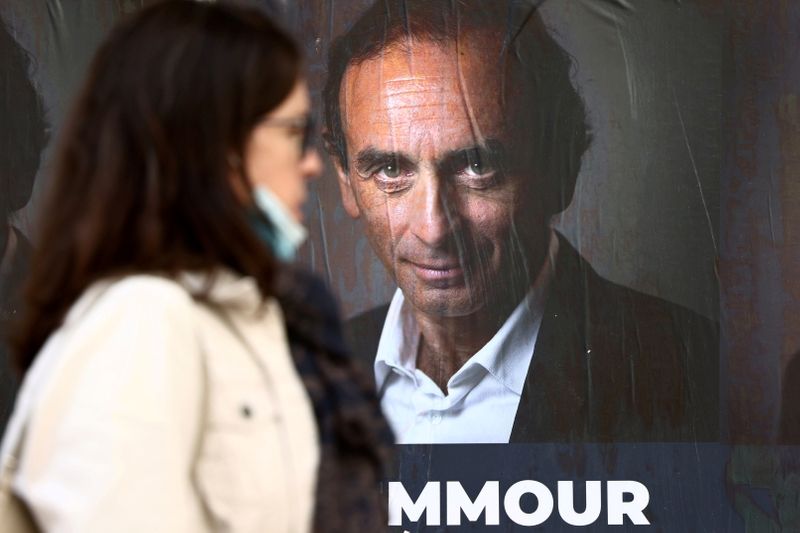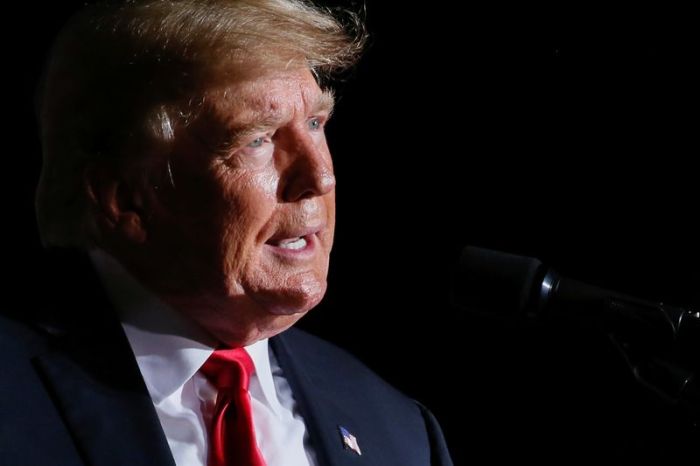PARIS (Reuters) – Far-right French pundit Eric Zemmour announced his candidacy for president on Tuesday with a video in which, to ominous music and footage of street violence, he said he wanted to save France from decadence and minorities that “oppress the majority”.
A former journalist who has been convicted of inciting racial hatred, he is the top contender to challenge Marine Le Pen, leader of the more established far-right National Rally, for a place in a second round against President Emmanuel Macron.
His candidacy turns the April 2022 election into a test of the endurance and limits of Europe’s far right, which surged in the last decade but shows signs of reaching a ceiling as it pushes against boundaries of acceptable speech.
“For a long time I was happy with the role of journalist … but I no longer trust that a politician will have the courage to save the country from the tragic fate that awaits it,” Zemmour, 63, said in a video posted on social media. “That’s why I have decided to stand in the presidential election.”
Zemmour’s hardline criticism of Islam and immigration has drawn support both from Le Pen’s voter base and from the mainstream conservative right, but has also alienated some voters that Le Pen had long sought to reassure.
As footage showed women with headscarves, Black men in the metro and CCTV footage of fights, he told voters on Tuesday that, watching movies, walking on the street or going to hospital: “You feel like you are no longer in the country you once knew … you are foreigners in your own country.”
“We must give back the power to the people, take it back from minorities that oppress the majority,” he added.
After a meteoric rise in opinion polls over the past weeks, with several surveys forecasting he would beat Le Pen to the election’s run-off round, his popularity has been slipping.
PROVOCATIVE COMMENTS
Zemmour led Le Pen for a while in recent weeks, and the race for the number two spot is still neck-and-neck in some surveys.
But at this stage, most opinion polls forecast that Macron and Le Pen will face each other in the second round next April, which Macron would likely win in a repeat of the 2017 election.
A Harris Interactive poll published on Tuesday – with people surveyed before Zemmour confirmed his widely expected candidacy – showed him down three to four percentage points at around 13% of voting intentions, pointing to the impact of various recent mishaps.
One was at the weekend, when he was photographed giving the middle finger to a protester following a tumultuous campaign stop in Marseille. He also sued gossip magazine Closer after it claimed he was expecting a baby with his chief political aide.
Surveys also show he has shocked some voters with provocative comments – from saying children shouldn’t be given foreign-sounding names to claiming that the French government of Philippe Petain which collaborated with the Nazis during World War Two had protected Jews. And he has lost the backing of some high-profile supporters, French media say.
“He’s imitating de Gaulle but he defends the idea of Petain,” Antoine Leaument, from the far-left France Insoumise party, said of Zemmour’s candidacy video.
De Gaulle, the towering figure of 20th century French history, led the nation’s resistance to Nazi occupation during World War Two. Zemmour’s video, in which he appeared speaking behind a huge mike and in front of ancient books stacked on shelves, had hints of De Gaulle’s wartime calls for resistance.
“Our opponent is Emmanuel Macron,” Sebastien Chenu, from Le Pen’s National Rally, told BFM TV, trying to shrug off Zemmour’s candidacy. “We don’t see him (Zemmour) bringing anything new.”
(Additional reporting by Elizabeth Pineau and Sudip Kar-Gupta; Writing by Ingrid Melander; Editing by Peter Graff and Nick Macfie)
























